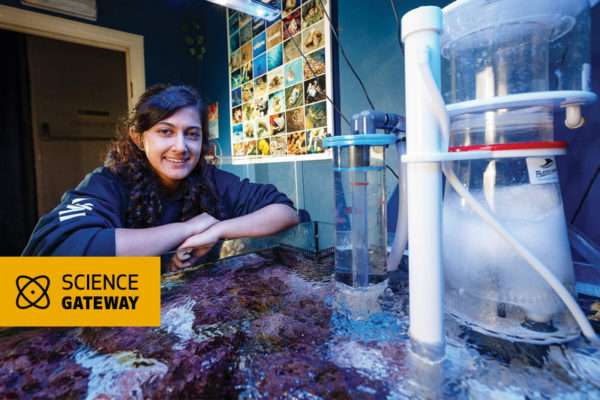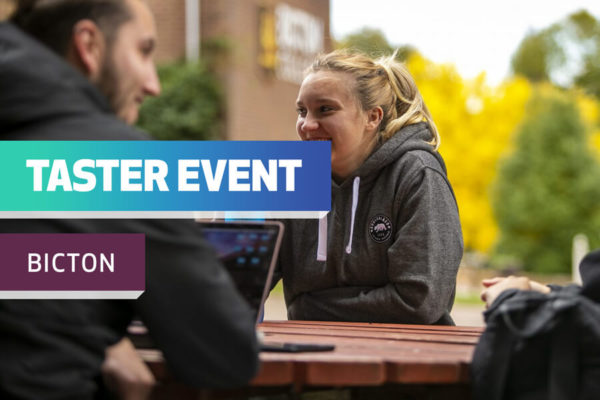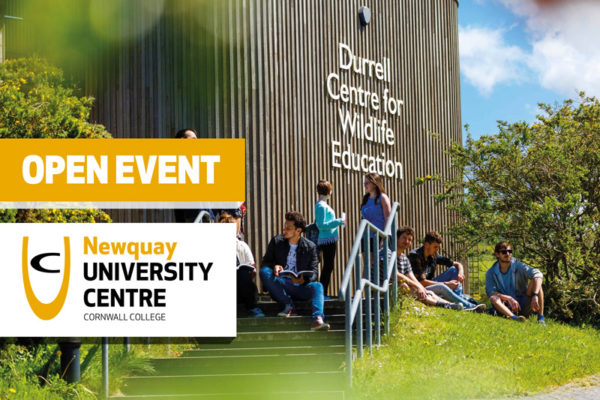Marine Biology with Conservation with Science Gateway
Newquay University Centre Cornwall College - 18 September 2025
3 years
Full-time

Course information
 Do you have the passion and potential to study one of our university-level programmes, but not the necessary qualifications to start?
Do you have the passion and potential to study one of our university-level programmes, but not the necessary qualifications to start?
Our Science Gateway course is the perfect solution.
Whether you are returning to education or your results weren’t quite what you hoped for, the Science Gateway provides a high-quality route into the large range of science foundation degree (FdSc) programmes at Newquay University Centre Cornwall College.
Science Gateway is designed to prepare you to succeed on a foundation degree in a number of ways.
It’ll help to develop your knowledge of core underpinning scientific concepts, as well as subject knowledge specifically related to your chosen subject area.
With our focus on building practical skills; you’ll gain confidence and competence in both the laboratory and fieldwork. Alongside this, the development of your academic study skills will help to boost your research competencies and overall employability.
You will study at our thriving Newquay campus, set against an inspirational backdrop of wild and rugged headland, sheltered coves, freshwater streams, saltmarsh and sprawling estuaries.
For over 20 years, Newquay University Centre Cornwall College has inspired thousands of science graduates to make a difference, using their passion as a guide.
Our small supportive group sizes and friendly experienced tutors create a family-feel that’s unlike any university experience you will have seen. Another benefit is the contact you’ll get with academic staff teaching at higher levels, ranging from formal tutorials and lessons to attendance at oral and poster presentation sessions.
So, what are you waiting for? The Science Gateway programme is the ideal way to progress onto your foundation degree, knowing that you are well-prepared, not just to achieve but to excel.
Following on from the Science Gateway year you may then progress onto the FdSc Marine Biology with Conservation
What is more exciting or enigmatic than the life in our oceans? We still know so little about this alien world which makes up 98% of the living space on our planet, forget space, the ocean is the final wild frontier out there to explore. It is an exciting time to be involved in any aspect of marine science; a crucial one too, as our impact on the world’s oceans has never been greater. There has never been a more urgent need for impassioned marine biologists who can speak for the ocean and its inhabitants. So much so that The United Nations has proclaimed 2021-2030 to be the Decade of Ocean Science for Sustainable Development.
And where better to study marine life and conservation than here in Cornwall, a county which has always been intricately linked to the seas around it? A range of aquatic habitats from wild to sheltered coast, freshwater streams, saltmarsh and estuary is all accessible within 20 minutes walking from the campus, with an additional variety of habitats a short drive away. In addition there is a local a dive school with a range of dive courses on offer, a research-equipped vessel for coastal work operating out of Newquay harbour.
Perhaps it’s the inspirational location that has created such an active and an enthusiastic marine conservation community in Cornwall, from local marine community groups like Newquay Marine Group to charities such as Cornwall Wildlife Trust, Cornwall Seal Group Research Trust and British Divers Marine Life Rescue giving ample opportunities for students to join in ground roots conservation work whilst they study.
As a college which has always focused on the applied nature of Foundation Degrees, employability and real-world relevance is at the heart of everything we do. To that aim there is considerable emphasis on building practical skills and survey experience underpinned by a strong academic and scientific core. To complement their degree students will receive bursaries to undertake courses in relevant skills such as diving or boat handling.
Our small, friendly campus has a rural feel in the heart of Newquay. The staff are research active and bring that expertise to the class. We often encourage students who write exceptional and publishable project reports to co-write their work for scientific publication, with them as the lead author. Students will be 10-30 minutes’ walk from a range of north Cornish coast habitats, a dive school with a range of dive courses on offer, a local and very active marine conservation group, a research-equipped vessel for coastal work and are?45 minutes’ drive from an additional range of south Cornish coast habitats.
The FdSc Marine Biology with Conservation, with Science Gateway is ideal if you would like to study for a Foundation Degrees (FdSc), but do not have the right qualifications or grades to do so. The Science Gateway will prepare you for success on our FdSc programmes by helping you develop your knowledge in relevant areas of biology and chemistry, your practical skills, and your academic study skills.
The Science Gateway course includes modules designed to prepare you for Higher Education. These modules will be assessed in a range of ways, including essays, reports, exams, presentations, and practical tasks.
Foundation Biology
This module introduces learners to the key principles in biology - no prior knowledge is required. The module also provides a range of opportunities to complete laboratory practical work. Learners will develop competence in key practical techniques and build confidence in a laboratory setting.
Foundation Chemistry
This module introduces learners to the key principles of chemistry - no prior knowledge is required. Beginning with atomic theory the module progresses to chemical bonding and organic chemistry. Finally, the module includes an introduction to environmental chemistry with a focus on plastics and pollutants. Theory is supported by practical work.
Fieldwork Techniques
This module introduces basic ecological concepts such as biomes, nutrient cycles, food webs, and the classification of plants and animals. It also provides a range of opportunities to plan and undertake field surveys. Learners will phrase and test hypotheses, develop competence in key practical and analytical techniques and build confidence in field settings.
Research Techniques
This module encourages students to engage with the primary literature, becoming comfortable with identifying appropriate sources and articles, interpreting and extracting relevant information, and communicating that information through different methods.
Study Skills for HE
This module helps refresh basic mathematical and literacy skills needed to start in Higher Education and develops research and study skills needed for success.
First year modules include:
Our Ocean Planet
This 40-credit module encompasses the UNESCO promoted Ocean Literacy principles; integrating oceanography and marine ecology for a holistic understanding of our global ocean. Currents, weather and ocean chemistry are inextricably bound to, influence and are in turn are influenced by life in the oceans and on the land.
Skills for Scientific Success
The ability to?process and analyse?raw data, find patterns and communicate findings to others is a critical skill in the sciences. This module aims to produce students with the necessary toolkit to handle data, apply appropriate methods to establish patterns and to communicate findings to different audiences and/or stakeholders.
Fundamentals of Biology
This biology-based module provides students with an understanding of the key anatomical and physiological concepts and practical skills which underpin the study of marine organisms.
Diversity of Life
This module introduces the incredible diversity of life on Earth and the systems of taxonomy and classification that we use to understand it. The module will introduce the basic theories of evolution and by which it works.
Marine Survey Techniques
In order to conserve the ocean, we must first understand it and to understand it we have to know how to explore it! This module is designed to introduce the skills needed to investigate marine life and habitats safely and responsibly. Theory of effective survey design is taught practically through a series of field and laboratory workshops. These will be reviewed and underpinned with class sessions to develop skills and understanding of survey design, data collection, data handling and analysis. Students will be introduced to the principles of GIS (Geographical Information System software) and how to use this to produce maps.
Second year modules include:
Marine vertebrate biology and conservation
This module explores the functional biology of marine vertebrates, focussing especially on key conservation flagship species from fish, marine reptiles, seabirds and marine mammals. The feeding, physiological and morphological adaptations to the marine environment, locomotion and migration, social and reproductive behaviour will be explored using case studies and related to their conservation. Classwork and some focused fieldwork allows the development and evaluation of field skills, survey techniques and technology used to monitor these species.
Marine Invertebrates
This module provides an introduction to the biology and ecology of key marine invertebrates including cnidarians, molluscs, crustaceans, and echinoderms with particular reference to local species in Cornwall and south-west England. Emphasis will be directed towards unique adaptations and characteristics of the key phyla as well as major conservation issues surrounding marine invertebrates. Visits to local businesses allows the exploration of aquaculture and stock enhancement of populations alongside techniques and strategies for monitoring stocks.
Marine Biology in Practice
It is important that the ocean scientist is able to communicate what they have learned to the wider public. However, that learning is also valuable to the scientist: this is the accrued experience that will allow them to progress to future employment. This module teaches students how to educate the public, and also to record and reflect on experiences that benefit themselves.
Husbandry and Conservation of Aquatic Organisms
Aquaculture in its many forms can have important benefits for humans and conservation, conversely it has many negative impacts also. This module addresses the husbandry of aquatic life from the small practical details of home aquaria to the industrial scale of public aquariums and fish farms. It also explores the conservation issues surrounding focal species and their habitats.
Marine Survey Techniques
This module builds on the skills taught in the first year in order to enable students to design surveys and carry out scientific study of marine habitats and species work effectively, safely and responsibly. The rapidly growing developments in technology used will also be appraised and evaluated.
Individual Research Project
This module gives students the opportunity to conduct their own research project. Student involvement and responsibility stretches from project conception and planning, literature research, analysis and interpretation of data to report writing and presentation. It addresses key skills in research design and data handling.

Newquay University Centre Cornwall College
Newquay University Centre Cornwall College is a small but vibrant campus specialising in university level courses focussing on the environment. For over 20 years, we have inspired hundreds of students to make that all-important difference, using their passion as a guide. Our dedicated higher education campus is home to the marine science, zoology and surf stars of the future.
Championing #generationrestoration, this campus may be small, but its students and staff have a big impact on our planet and its future wellbeing. Likeminded individuals come together to undertake international, award-winning research, meaning when their incredible time at Newquay is done, they move onto fantastic and important careers.
It’s why you should definitely consider Newquay University Centre Cornwall College for your #careercollege experience.
Find out more about studying at Newquay
Find out more about our Newquay campus
Events
Taster Day at Bicton College
16-19 Apprenticeship University- Dates
28th October 2024, 9:00am - 3:30pm
17th February 2025, 9:00am - 3:30pm
28th May 2025, 9:00am - 3:30pm
Newquay University Centre Cornwall College Open Day
Adult University- Dates
9th November 2024, 11:00am - 1:00pm
11th January 2025, 11:00am - 1:00pm
21st June 2025, 11:00am - 1:00pm
Related Topics

Start your application
| Course type | University |
| Apply now via UCAS | |
Tuition Fees: £9250.00
Fees are per academic year for Home/UK students. Financial support for University students |
|
Course Code 12067-NQY-25
Courses listed on this website are indicative of the subject, nature and level of study. The College reserves the right to alter specific qualifications titles, awarding bodies and levels of qualification, which can change in year. Any cost may also vary, based on personal funding eligibility. The Cornwall College Group reserves the right to withdraw any course listed at any time.




